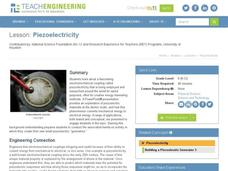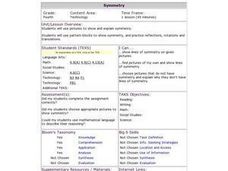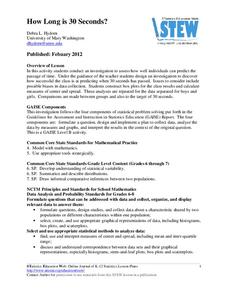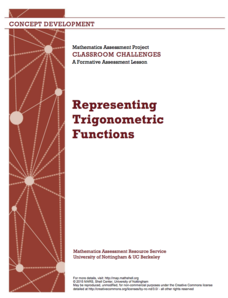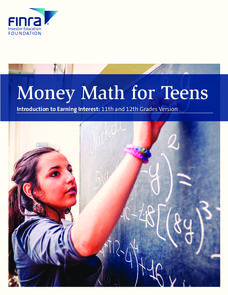Teach Engineering
Electromagnetic Radiation
How can nanoparticles be used in the battle against skin cancer. Class members take on the question as they gather information about electromagnetic radiation, specifically ultraviolet radiation. Pupils learn about the mathematical...
Teach Engineering
Piezoelectricity
What effect makes children's shoes light up? Answer: Piezoelectric effect. Here is a PowerPoint presentation that describes piezoelectric materials as being able to convert mechanical energy to electrical energy. Individuals learn how...
Florida International University
The Good, the Bad and the Nasty Tasting
Examine the benefits of chemical defense mechanisms. Organisms in oceans use chemicals to ward off predators. Duplicate this adaptation using a hands-on experiment in which you ward off your predators (your pupils) with some...
Project Articulate
Textured Landscapes with Grant Wood
Explore the world of textured landscapes through the eyes of the famous artist, Grant Wood. Here is an elementary art lesson in which scholars learn about Grant Wood's life, view his work, draw their own textured landscape, and then...
Teach Engineering
May the Force Be with You: Weight
Too much material will weigh you down. The sixth segment in a series of 22 highlights how weight affects a plane. Pupils learn that engineers take the properties of materials, including weight, when designing something.
Teach Engineering
Floaters and Sinkers
Whatever floats your boat. Young engineers learn about density by measuring the masses and volumes of boxes filled with different materials. Using their knowledge of densities, they hypothesize whether objects with given densities will...
Teach Engineering
Understanding Elements
Nothing says organization quite like a table. The third lesson in a six-part Mixtures and Solutions unit teaches young scientists about elements and the periodic table. They learn how the periodic table is organized and about the...
Teach Engineering
Archimedes' Principle, Pascal's Law and Bernoulli's Principle
What do Pascal's law, Archimedes' Principle, and Bernoulli's Principle have to do with fluid mechanics? The included PowerPoint presentation provides the basic definitions and equations associated with the three. A set of homework...
Kenan Fellows
The Little Stuff Can Make a Big Difference
Great things come in small packages! What better way to illustrate this point than a week-long look at nanotechnology? Earth science scholars explore water quality issues through lab activities, then research new innovations in nanotech...
Kenan Fellows
Isotopic Pennies
Many people confuse atomic mass and atomic numbers. The sixth of seven lessons in a unit requires scholars to find the weight of different groups of pennies. Then, they must solve how many of each type of penny exists in a closed system...
Curated OER
Shapes and Patterns in Art and Oceans
First graders draw, cut out, and design their own fish shapes by cutting out shapes and putting them together. In this shapes and patterns worksheet, 1st graders also construct a stamp and print patterns with stamps to repeat a...
Curated OER
Science in baseball
Sixth graders examine how science is used in everyday activities, such as baseball.
Illustrative Mathematics
Equivalent Expressions?
Pre-algebra pupils need to understand that two expressions are only equal if they have the same value. Show them that once the expression is multiplied by a number, the value of the expression changes. It makes for a good lead-in to...
Curated OER
When I Was Young In Appalachia
Young scholars comapre and contrast the lifestyles of the people of the Applachian region with their own community through in-class discussions, creative projects, hands-on activities, food preservation, homemade remedies, home...
Curated OER
Government: Texans in Politics and Civic Duties
Fourth graders examine the influence of Texans in national politics. They interview adults about the importance of participating in civic affairs. Students create brochures with three true statements and one falsehood. They trade copies...
Curated OER
Math/Technology: Symmetry
Fourth graders, using KidPix, use stamps and pencil tools to illustrate which pictures have symmetry. They add text boxes to explain their answers in math terms. Students practice skills in rotation, reflection, and translation on an...
Curated OER
Drive the Data Derby
Three days of race car design and driving through the classroom while guessing probability could be a third graders dream. Learn to record car speed, distances traveled, and statistics by using calculation ranges using the mean, median,...
EduGAINs
Ratio and Proportion
Do these items have the same ratio? Through a learning contract, pupils master proportions by practicing proportions via word problems, graphs, and with manipulatives. An exit ticket checks for understanding at the end of the...
American Statistical Association
How Long is 30 Seconds?
Is time on your side? Pupils come up with an experiment to test whether their classmates can guess how long it takes for 30 seconds to elapse. They divide the class data into two groups, create box-and-whisker plots, and analyze the...
Mathematics Assessment Project
Representing Trigonometric Functions
Discover the classic example of periodicity: Ferris wheels. Young mathematicians learn about trigonometric functions through Ferris wheels. They match functions to their graphs and relate the functions to the context.
Arizona Department of Education
Introduction to Integers
Welcome to the backward world of negative numbers. This introductory lesson teaches young mathematicians that negative numbers are simply the opposite of positive numbers as they use number lines to plot and compare...
Curated OER
Number Operations
Inject fun into your math review! Pupils review basic math operations with decimals as well as addition and subtraction with simple fractions. In this number operations instructional activity, students work in groups to create a game for...
SaveandInvest.org
Introduction to Earning Interest: Grades 9-10
Does your bank pay you for allowing them to hold your money? The lesson covers three different ways your money can make money. Topics include certificates of deposit, statement savings accounts, and money market accounts.
SaveandInvest.org
Introduction to Earning Interest: Grades 11-12
Does your bank pay you for allowing them to hold your money? Class members investigate three different ways money can make more money. Topics include certificates of deposit, statement savings accounts, and money market accounts....

